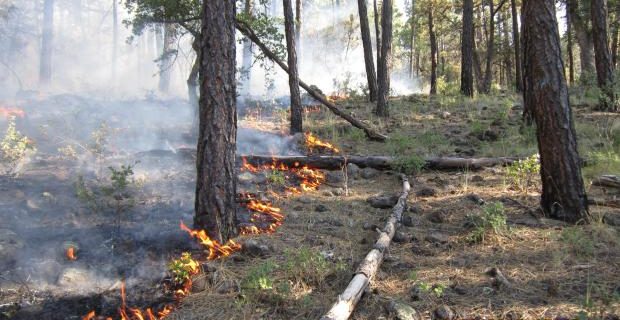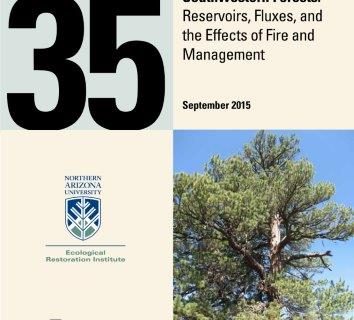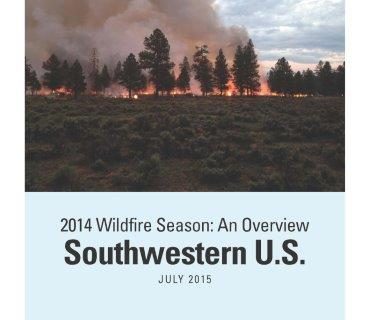The importance of fire in many western ecosystems cannot be overstated. On the Kaibab National Forest, fire provides habitat for wildlife, maintains watersheds, and supports forest health and productivity. Fire also influences a wide range of values, resources, and ecosystem services. On the Kaibab, resource specialists have a strong understanding and appreciation for the benefits of fire, and they work closely with the fire staff to ensure that fire management and resource management are one in the same. View the YouTube video here.
November 10, 2015: Mixed Conifer Forest Ecology: Emerging Science
This will be a panel presentation followed by a question/answer and discussion, approximately 90 minutes in length Assessing and analyzing mixed conifer spatial patterns of northern Arizona (Kyle Rodman) Effects of tree cutting and fire on understory vegetation in mixed conifer forests (Judy Springer) Treatement effectiveness of mixed conifer treatments in the Wallow Fire (Amy Waltz) Overview …
Read more “November 10, 2015: Mixed Conifer Forest Ecology: Emerging Science”
October 21, 2015: Local Ecological Knowledge and Fire Management: What Does the Public Understand?
Date: Wednesday, October 21, 2015 1pm MDT (12pm AZ) Presenters: John Diaz, North Carolina State University As fire management agencies seek to implement more flexible fire management strategies, local understanding and support for these strategies become increasingly important. One issue associated with implementing more flexible fire management strategies is educating local populations about fire management and identifying …
September 10, 2015: Fire Management on the San Carlos Apache Reservation
We took a full day field trip to visit various fires managed through partnership between the San Carlos Apache (SCA) Tribe and the BIA San Carlos Agency. Over the last several years, they have built a mosaic of fire by allowing fire to retake its natural role across the Nantac Rim. Recent fires on the …
Read more “September 10, 2015: Fire Management on the San Carlos Apache Reservation”
The New Normal: Wildfire in the 21st Century
The New Normal: Wildfire in the 21st Century, is intended for public use. It explains current issues as they relate to fire management and what managers are doing to help build resilient landscapes. Please share widely and help spread the message about positive fire management.
There is growing recognition that many forests need fire to thin dense vegetation that chokes forest health and creates favorable settings for more destructive fires. Also, climate change has produced hotter, drier weather across the West, and this has directly led to more extreme wildfire behavior over the past few decades. View the YouTube video here.
August 26, 2015: Climate change and fire in the Southwest
Presenter: Larissa Yocom, Northern Arizona University Global climate change will lead to shifts in climate patterns and fire regimes in the Southwest over coming decades. The intent of this webinar is to summarize the current state of scientific knowledge about climate change predictions in the Southwest as well as the pathways by which fire might …
Read more “August 26, 2015: Climate change and fire in the Southwest”
Carbon Cycling in Southwestern Forests
The intent of this working paper is to explain the basics of the carbon cycle detailing how much carbon moves through vegetation, water, and soils over time. The paper also summarizes where current science suggests that carbon cycling patterns are most likely to change in the coming years to decades, and how management can influence …
September 2015: Immediate post-wildfire effects on bats in the Southwest
Presenters: Erin Saunders Northern Arizona University and U.S. Forest Service, and Carol Chambers, Northern Arizona University Ponderosa pine forests in the southwestern U.S. have increased in density over the last 100 years which has dramatically increased the size and frequency of wildfires. Although wildfires rarely kill animals, they have immediate consequences to bat populations by drastically …
Read more “September 2015: Immediate post-wildfire effects on bats in the Southwest”
July 8, 2015: Connecting resilience science with decision-making: Guidelines for the effective development and application of scientific information
Presenter: Melanie Colavito, University of Arizona This webinar describes the results of a study that sought to identify barriers and opportunities to the use of scientific information about resilience for decision-making and on-the-ground management. Data for this study was collected from interviews that were conducted with scientists, managers, and other stakeholders following “Fostering resilience in …
2014 SW Wildfire Season Overview
View working paper. Reduced size for web viewing, please contact the SWFSC for a full resolution version.



